Asian American Sexual Politics
Asian American Sexual Politics
The Construction of Race, Gender, and Sexuality
Rosalind S. Chou
ROWMAN & LITTLEFIELD PUBLISHERS, INC.
Lanham Boulder New York Toronto Plymouth, UK
Published by Rowman & Littlefield Publishers, Inc.
A wholly owned subsidiary of The Rowman & Littlefield Publishing Group, Inc.
4501 Forbes Boulevard, Suite 200, Lanham, Maryland 20706
www.rowman.com
10 Thornbury Road, Plymouth PL6 7PP, United Kingdom
Copyright 2012 by Rowman & Litlefield Publishers, Inc.
All rights reserved. No part of this book may be reproduced in any form or by any electronic or mechanical means, including information storage and retrieval systems, without written permission from the publisher, except by a reviewer who may quote passages in a review.
British Library Cataloguing in Publication Information Available
Library of Congress Cataloging-in-Publication Data
Chou, Rosalind.
Asian American sexual politics : the construction of race, gender, and sexuality / Rosalind S. Chou.
p. cm.
Includes index.
ISBN 978-1-4422-0924-4 (cloth : alk. paper) -- ISBN 978-1-4422-0926-8 (electronic)
1. Asian American women--Sexual behavior. 2. Asian Americans--Social conditions. I. Title.
HQ29.C47 2012
306.76089'95073--dc23
2012012097

The paper used in this publication meets the minimum requirements of American National Standard for Information Sciences Permanence of Paper for Printed Library Materials, ANSI/NISO Z39.48-1992.
Printed in the United States of America
This book is dedicated to my parents, Charlie and Snow Chou.
I also dedicate it to the life and memory of Stuart J. Hysom (1964 - 2011)
Contents
Preface
Acknowledgments
| 1 | Why Asian American Sexual Politics? |
| 2 | The Making of Good Sons and Daughters |
| 3 | External ForcesUnder Western Eyes |
| 4 | Asian American Women: Self-Image, Self-Esteem, and Identity |
| 5 | Asian American Masculinity |
| 6 | Asian American Sexual Politics: Love and Relationships |
| 7 | Now What?: Resistance, Empowerment, and Counter-Frames |
Index
Preface
In the spring of 2009, I had to take my doctoral comprehensive exams. These exams are as close to hazing as you can get in academia. I had just completed three 14-hour writing days discussing the history of racialized and gendered oppression in the United States. I was mentally and physically exhausted. Just halfway through the weeklong exam, a day was built in the middle for rest. In the day off from exams, I attended a graduate student happy hour gathering in Austin, Texas. After spending three days deeply immersed in gender and race research, I was happy to enjoy some time away from my books and to see some friendly faces. However, my evening was quickly spoiled by an interaction with a bartender. My white friend and I walked up to the bar, and before I could even order anything, the bartender greeted me with mock Asian language and accent, delivering a statement about female anatomy that was reminiscent of early media portrayals of Asian prostitutes in war-torn countries soliciting soldiers with me so horny, me love you long time.
Although I should be used to this by now, I was caught off guard. I very calmly told him that I was not particularly fond of the underlying racialized tone of his comments. Instead of apologizing, he completely dismissed my request to knock it off and repeated his statement, word for word. I looked at my friend, who has unfortunately witnessed similar instances like this with me before, and I suggested that we leave this place of business. My night was spoiled, and I turned in early. My friend, who was also upset about the incident, was able to carry on with other friends into the early morning. The incident still felt like a heavy weight for me the following morning, making it more difficult for me to concentrate on my responsibilities. The clock was ticking to finish my exams and I had less than 36 hours left. The incident from the night before left me debilitated, and I could not write a word.
The incident led me to waste almost twenty-four hours being upset about what took place. I had been using up my emotional energy dealing with the incident, jeopardizing the future of my PhD. Even worse, I was beating myself up about how I handled it. In true model minority fashion, I was polite, calm, and almost cordial to the bartender. However, this morning, I allowed my suppressed emotions to be released. I had to deal with my sadness, anger, and tears at the most inconvenient time. I am actually a more tender person than my outward appearance and presentation suggest, but I usually manage these things without such emotional distress. This incident was the icing on the cake because it was the fourth racist incident in Austin in four months. I replayed the incident over and over, making excuses for the bartender, accusing myself of being too sensitive. The most absurd part of the whole story is that the bartender is a gay man, and I am a lesbian woman. This happened in a gay bar, so his performance was not an actual sexual proposition. He was pulling from a racial script already set in place, one that constructs Asian women as tasty treats to be consumed (I am paraphrasing his comments).
I wondered to myself if the fact that I am an Asian American woman opened the door for more public taunting in this self-proclaimed liberal island of Texas. The stereotype surrounding Asian Americans as model minoritieshard-working, diminutive, passive peoplegives license to these incidents because there is no perceived threat of resistance. I share this story because the racialized and gendered constructions of Asian Americans may precipitate this type of taunting with very few anticipated consequences. In that instance, my body was both racialized and sexualized in a particular fashion where controlling images of Asian American womens bodies were evoked. To the bartender, it was merely a joke or a way to interact with me. I felt demeaned and belittled and wish I could have conveyed that in an effective manner. I often joke with my friends that next time, they need to be ready to haul me out of the establishment because Im breaking a beer bottle on the countertop and doing everything I can to create an image so entirely opposite of the passive, submissive Asian woman who just allows people to talk to her like a piece of meat. While breaking a beer bottle is honestly not the most logical choice in that situation, it really exemplifies the physical and emotional management that is expected from people of color when they are mistreated. I would be stepping out of my gendered box to aggressively demand that I be treated as a whole human being. In many cases, African Americans are quickly and erroneously accused of being angry and out of control if they speak up and speak out about racism. The need for this kind of emotional management on the part of people of color is a consequence of white supremacy.
My interaction with the bartender and the way I was gendered, racialized, and sexualized in that moment cemented why I needed to write this book. The incident and the many others described by my interview respondents illustrate how Asian Americans are uniquely affected by interlocking systems of oppression. Asian American intersections of race, gender, and sexuality have not been thoroughly explored and discussed in this manner. In the following chapters, sixty Asian Americans share their stories and my hope is that I can contribute to the understanding of how interlocking systems of oppression such as racial domination, colonialism, hegemonic masculinity, and heterosexism interact in and affect the lives of Asian Americans.

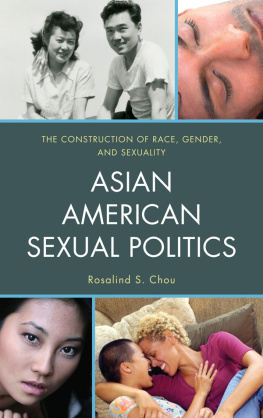

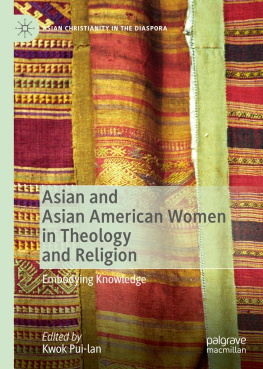
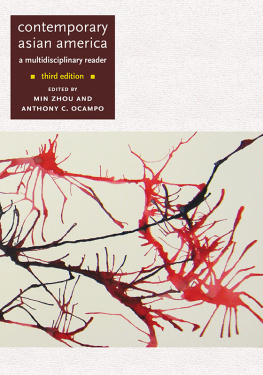
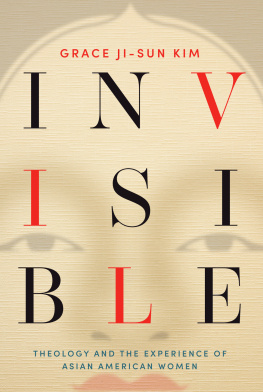

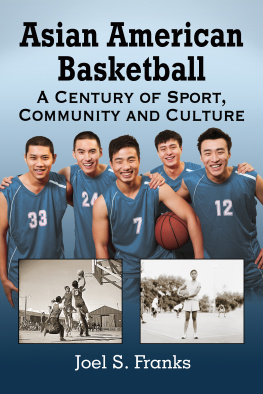
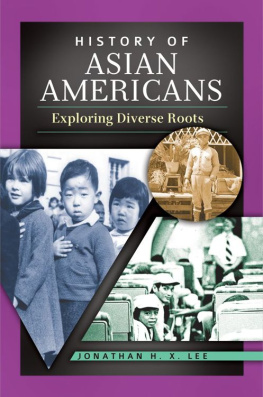
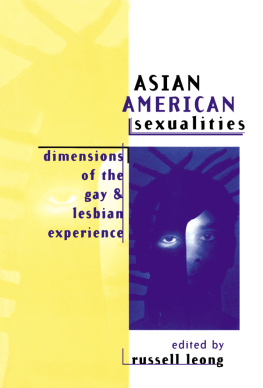
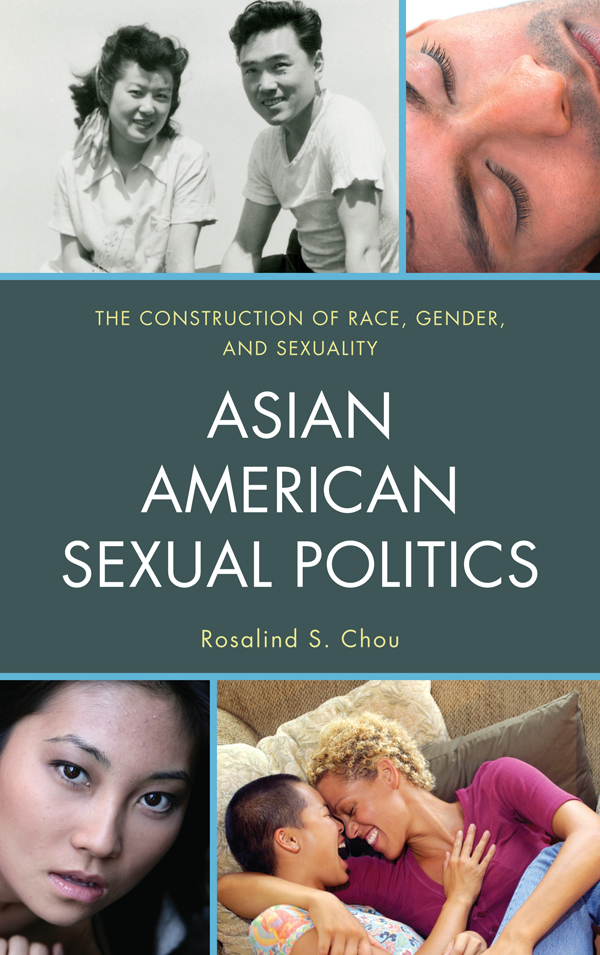
 The paper used in this publication meets the minimum requirements of American National Standard for Information Sciences Permanence of Paper for Printed Library Materials, ANSI/NISO Z39.48-1992.
The paper used in this publication meets the minimum requirements of American National Standard for Information Sciences Permanence of Paper for Printed Library Materials, ANSI/NISO Z39.48-1992.